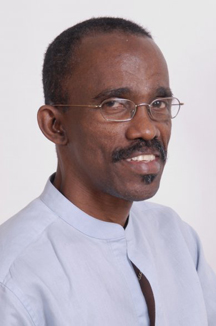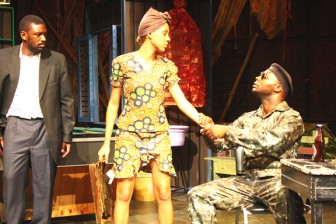By Jairo Rodrigues
Theatre Guild diehards will remember his memorable performances as Moustique in the Dereck Walcott play Dream on Monkey Mountain and as Brother Jero in The Jero Plays by Wole Soyinka, but Guyanese Eugene Williams, current Director of the Jamaica School of Drama has, for a number of years, been directing and teaching rather than acting.
Born in Beterverwagting on the East Coast Demerara where he lived until age 16, Eugene started working at the post office at age 14 and was later transferred to Cane Grove then to Mahaica and finally to Kitty. After about two years at Kitty Post Office he entered the civil service – working at the Ministry of Health where he moved up from being a clerk to the Secretary of the Central Board of Health.
In an online interview with The Scene, Eugene recalled that his father died when he was about four years old, so for most of his life his immediate family was his mother and sister. His mother, a domestic worker, was the sole breadwinner, which meant that they were deprived of most amenities except those for basic survival. Eugene said that having a proper bed, stove, running water, electric lights and even a kitchen and bathroom only came some years after he started to work. “But given the environment that we were in we never really felt terribly deprived,” he recalled.

Eugene’s true interest in the dramatic arts was stirred from about age 6, owing to his family’s daily evening radio ritual. They “religiously” listened to programmes such as “Aunt Mar A Good Neighbour”, a Grace Gibson production and “Dr Paul” another popular radio serial of similar vintage, he said.
As he got older and became an altar server in the Roman Catholic Church, he entered for the first time into the ritualistic routine of rehearsals, the study of Latin, ritual gesture, the importance of various garments that the altar servers and priests wore, the careful manipulation of objects during the mass, singing and so on. “And, of course, all of this was being done before a congregation, which was my first audience as it were,” he said. “In retrospect I can see that each mass was a performance and much of the aesthetic sensibility that I now bring to my work as a theatre director was shaped in those early days.”
His lone claim to drama fame during his school days was a walk on as a shepherd during the Christmas nativity play. But a key influence in his all-round education was a teacher at the Beterverwagting All Age School – Olga Cruickshank, who encouraged all her students to read, pursue the educational opportunities and saw to it that they were active members of the village library. “Reading fiction and biographies opened up my little rural mind to ideas, encouraged a fascination with the English Language and nurtured my appetite for knowledge,” he said. He recalled that when he dropped out of school at age 14 to work at the village post office out of necessity, it was Mrs Cruickshank who stopped him in his tracks one day and encouraged him to finish his studies towards the College of Preceptors Examination and then to do some GCE subjects. He took her advice, worked and studied and passed all of his subjects with “flying colours”.
In the 1970s he saw an advertisement in the press for members of the Theatre Guild. He responded and joined the backstage crew for a production of Inez Combray, which was being directed by John Rollins. And the rest, as they say, is history.

Apart from Dream on Monkey Mountain and The Jero Plays, Eugene said another memorable performance was as Norman in Alan Ayckbourne’s The Norman Conquests, which he also acted in at the Theatre Guild. He played several lead roles on the Guild stage and was even an adjudicator in Guyfesta (the Guyana Festival of Arts).
Some of his early influences at the Theatre Guild were Clairmont Taitt, Marc Matthews, Bob Carr, Eileen McAndrew, George McKenzie and Bernard Gardner; people who had a lasting impact on his sense of theatre. His inspiration at that time also came from the plays that were done at the Guild, particularly the works of Walcott, Shakespeare and Arthur Miller. He also worked with Francis Farrier. His partner in performing local plays, Farrier encouraged him to write his own plays and perform in experimental ways.
“For me this was an intense process of maturation in the most culturally exciting time in Guyana. But I was also dissatisfied because I wanted to do theatre full time which meant professional training and the funds to do so, fortunately the Theatre Guild assisted,” he remarked.
Eugene went to study theatre at the Jamaica School of Drama in 1976 with the intention of returning to Guyana even though the Guyana Government had turned down his application for a scholarship.
When he graduated, he was offered a job to start a company of graduates which went on to do groundbreaking work in the entire Caribbean region. He switched from acting to directing and subsequently joined the faculty as a lecturer. Since then, he has received a Ford Foundation and Fulbright Scholarships to do graduate studies in the US. He is now the Director of the Jamaica School of Drama which is part of the Edna Manley College.
“My field of work is that of a drama educator and a director as I continue to direct plays within the college and the local theatre industry. The performing arts industry in Jamaica is the most dynamic in the region,” he said.
He is constantly engaged in teaching, curriculum development, workshops and directing plays and in an advisory capacity. In his field of work he is therefore directly impacting the education process, through the school’s graduates who become teachers and the theatre industry through alternative choices of work.
“It is difficult to identify one piece of my work as the most outstanding,” he told The Scene when asked about his most accomplished piece to date. “I still have fond memories of my thesis production of Michael Gilkes’ Couvade… In that production I went back to the philosophical writing of Wilson Harris, which still occupies me today in terms of developing a post colonial technique for the Caribbean actor. I have also directed leading Jamaican actors such as Charles Hyatt and Leonie Forbes in productions such as Arawak Gold, which was a truly outstanding musical.” Eugene is currently directing a number of outstanding Jamaican actors in Trevor Rhone’s Old Story Time as part of Jamaica’s fiftieth anniversary celebration.
Eugene has received the Best Director Award from Actor Boy Awards in Jamaica for the play Arawak Gold and the Silver Musgrave Medal from the Institute of Jamaica for his contributions to drama education.
He believes that throughout most of the Anglo-Caribbean, theatre productions and development are left up to the commercial arena, which only cultivates superficial entertainment. “I would like to see and to be engaged in a lobby for a non-profit (funded) theatre movement supported by governments and private sector that allows for the development of a theatre of ideas and a landscape in the performing arts that encourages alternatives and experimental approaches that are enriching to the arts themselves and educational for all involved,” he said.is future plans involve developing his research work on a Caribbean performance technique and he hopes to find the time to contribute to the development of new plays by working with young playwrights through to production.








